
Updated Audacity Setup Guide for Ubuntu Installs, Uninstalls & Troubleshooting Tips

“Audacity Setup Guide for Ubuntu: Installs, Uninstalls & Troubleshooting Tips”
Open-source audio editor Audacity is available for free download and usage. It is one of the most popular multi-track audio editing tools for Windows, Mac OS X, and Linux. Audio recordings may be recorded, edited, spliced, and altered with Audacity. How to install Audacity on your Ubuntu 20.04 LTS system is explained in this post.
Key Features of Audacity
- Creative Commons Attribution-NonCommercial-ShareAlike License
- It is a cross-platform program
- Sound files may be imported, edited, and combined. Use a variety of file types when exporting your recordings. You may even export many files at once.
- Record and playback live sound
- Audio Quality: Audacity can playback 16-bit, 24-bit, and 32-bit audio files, respectively.
- Accessible in 38 different dialects
- Assistive Listening Device
- Keyboard shortcuts are many
- A wide range of audio formats is supported, including AIFF, WAV, FLAC, and MP2.
- With the keyboard, tracks and choices may be handled to their greatest extent
- VST and Audio Unit effect plug-ins are supported. Plug-ins may even be written by you.
- Duplicate, chop, combine, or splice together several sound documents.
- There is a slew of others…
Installation
The official website for Audacity shows version 2.4.2 as the most recent release. Download the newest version of Audacity for Ubuntu 20.04 and then install it.
- Install Audacity via PPA
- Install Audacity via Snap Store
First, we’ll use the PPA approach to install Audacity.
Install Audacity via PPA
Installing Audacity on an Ubuntu system is as simple as entering the following line in the terminal to include the unofficial PPA developed by “ubuntuhandbook” to the Ubuntu system’s software sources, then rebooting.
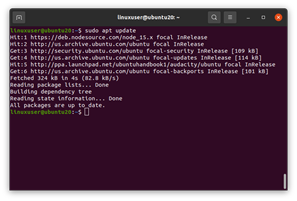
You will be prompted to hit the Enter key to proceed with the process of adding your Audacity package to your sources list. To begin the process of introducing PPA to the sources list, press the Enter key.
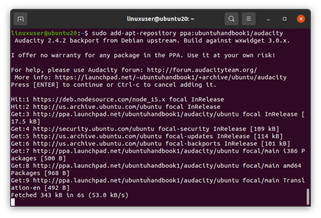
After you’ve added the Audacity package to the system’s software sources, you’ll need to update the package repository in order to get Audacity to work.
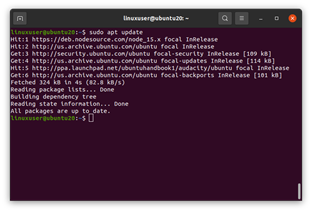
As soon as you have updated the package repository, you should be able to successfully install Audacity.
Navigate to Activities & type in the word ‘audacity’ to find it.
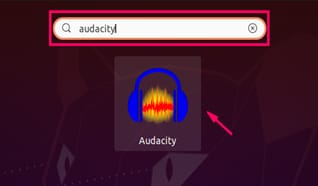
As you can see in the picture, Audacity has been successfully installed and is ready for usage on my PC.
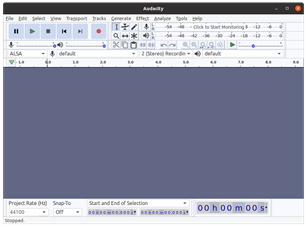
Installing Audacity from the Snap Store
A version of Audacity is also available for download via the Snap shop. Using a Snap is among the quickest and most straightforward methods of installing any program since it takes into account all of the application’s updates and dependencies. In order to install Audacity using Snap, you must first ensure that Snap is already installed on the Ubuntu system. Snap is pre-installed in the newest versions of Ubuntu and is available as a default. If Snap is not already installed on your system, you may do it by using the instructions shown below.

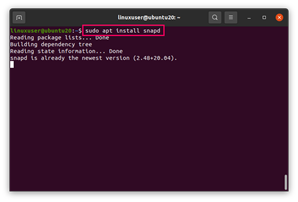
After safely installing Snap, you’ll be able to proceed to install Audacity by using the script provided in the next section.
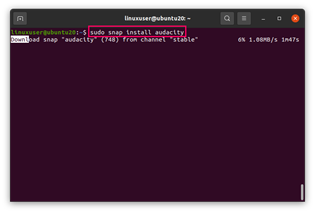
It will just take a few minutes to download & install Audacity on your computer.
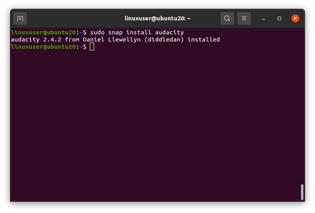
As soon as Audacity has been installed via the Snap method, launch the program by searching for the phrase ‘audacity’ in the Application menu.

To launch Audacity, click on the Audacity icon on your desktop.

How to uninstall Audacity Ubuntu
For whatever reason, if you wish to remove the Audacity program from your computer, you may follow these instructions.
Method 1
If you installed Audacity through the Snap method, execute the following command in your terminal: $ sudo snap remove Audacity
Method 2
If you have installed the application using the PPA, you may remove it by performing the instructions shown below.
>Step 1:
The first step is to
This indicates that the add-apt-repository command was used to add the PPA to your system. You may also use the same command to uninstall the PPA from your computer. Simply include the —remove option in your command.
$ sudo add-apt-repository –remove ppa:ubuntuhandbook1/audacity
>Step 2:
As of the right moment, the PPA has been withdrawn. What happens to the programs that are installed using these PPAs? Will they be eliminated as a consequence of the abolition of the Patriot Act? The answer is a resounding no.
Thus, PPA-purge enters the scene to help solve the problem. The PPA is disabled, but all of the apps installed by the PPA are also uninstalled, or they are reverted to the original versions given by your distribution.
Install the PPA-purge package and remove the Audacity package may be accomplished by running the following command.
$ sudo apt install ppa-purge && sudo ppa-purge ppa:ubuntuhandbook1/audacity
Conclusion
I hope you now have a clear grasp of installing and uninstalling Audacity on Ubuntu 20.04 LTS Focal Fossa. I hope this article has been helpful. Additionally, we cover Filmora’s voice effects & how users may use the program to improve and change their own voices. Filmora allows you to re-voice video/audio & previously recorded voiceovers. The Pitch option on the Timeline may be used with video/audio and voiceover files. Change the tone of a video and recording to make it sound unique. You may quickly alter the voices in the videos with Filmora. A story or video should accompany your viral. Allows you to alter the pitch of your voice by selecting the Changing Pitch option. You may adjust the video’s pace (Optional). Make a duplicate of the video or audio that has been altered.
For Win 7 or later (64-bit)
For macOS 10.12 or later
You will be prompted to hit the Enter key to proceed with the process of adding your Audacity package to your sources list. To begin the process of introducing PPA to the sources list, press the Enter key.

After you’ve added the Audacity package to the system’s software sources, you’ll need to update the package repository in order to get Audacity to work.

As soon as you have updated the package repository, you should be able to successfully install Audacity.
Navigate to Activities & type in the word ‘audacity’ to find it.

As you can see in the picture, Audacity has been successfully installed and is ready for usage on my PC.

Installing Audacity from the Snap Store
A version of Audacity is also available for download via the Snap shop. Using a Snap is among the quickest and most straightforward methods of installing any program since it takes into account all of the application’s updates and dependencies. In order to install Audacity using Snap, you must first ensure that Snap is already installed on the Ubuntu system. Snap is pre-installed in the newest versions of Ubuntu and is available as a default. If Snap is not already installed on your system, you may do it by using the instructions shown below.


After safely installing Snap, you’ll be able to proceed to install Audacity by using the script provided in the next section.

It will just take a few minutes to download & install Audacity on your computer.

As soon as Audacity has been installed via the Snap method, launch the program by searching for the phrase ‘audacity’ in the Application menu.

To launch Audacity, click on the Audacity icon on your desktop.

How to uninstall Audacity Ubuntu
For whatever reason, if you wish to remove the Audacity program from your computer, you may follow these instructions.
Method 1
If you installed Audacity through the Snap method, execute the following command in your terminal: $ sudo snap remove Audacity
Method 2
If you have installed the application using the PPA, you may remove it by performing the instructions shown below.
>Step 1:
The first step is to
This indicates that the add-apt-repository command was used to add the PPA to your system. You may also use the same command to uninstall the PPA from your computer. Simply include the —remove option in your command.
$ sudo add-apt-repository –remove ppa:ubuntuhandbook1/audacity
>Step 2:
As of the right moment, the PPA has been withdrawn. What happens to the programs that are installed using these PPAs? Will they be eliminated as a consequence of the abolition of the Patriot Act? The answer is a resounding no.
Thus, PPA-purge enters the scene to help solve the problem. The PPA is disabled, but all of the apps installed by the PPA are also uninstalled, or they are reverted to the original versions given by your distribution.
Install the PPA-purge package and remove the Audacity package may be accomplished by running the following command.
$ sudo apt install ppa-purge && sudo ppa-purge ppa:ubuntuhandbook1/audacity
Conclusion
I hope you now have a clear grasp of installing and uninstalling Audacity on Ubuntu 20.04 LTS Focal Fossa. I hope this article has been helpful. Additionally, we cover Filmora’s voice effects & how users may use the program to improve and change their own voices. Filmora allows you to re-voice video/audio & previously recorded voiceovers. The Pitch option on the Timeline may be used with video/audio and voiceover files. Change the tone of a video and recording to make it sound unique. You may quickly alter the voices in the videos with Filmora. A story or video should accompany your viral. Allows you to alter the pitch of your voice by selecting the Changing Pitch option. You may adjust the video’s pace (Optional). Make a duplicate of the video or audio that has been altered.
For Win 7 or later (64-bit)
For macOS 10.12 or later
You will be prompted to hit the Enter key to proceed with the process of adding your Audacity package to your sources list. To begin the process of introducing PPA to the sources list, press the Enter key.

After you’ve added the Audacity package to the system’s software sources, you’ll need to update the package repository in order to get Audacity to work.

As soon as you have updated the package repository, you should be able to successfully install Audacity.
Navigate to Activities & type in the word ‘audacity’ to find it.

As you can see in the picture, Audacity has been successfully installed and is ready for usage on my PC.

Installing Audacity from the Snap Store
A version of Audacity is also available for download via the Snap shop. Using a Snap is among the quickest and most straightforward methods of installing any program since it takes into account all of the application’s updates and dependencies. In order to install Audacity using Snap, you must first ensure that Snap is already installed on the Ubuntu system. Snap is pre-installed in the newest versions of Ubuntu and is available as a default. If Snap is not already installed on your system, you may do it by using the instructions shown below.


After safely installing Snap, you’ll be able to proceed to install Audacity by using the script provided in the next section.

It will just take a few minutes to download & install Audacity on your computer.

As soon as Audacity has been installed via the Snap method, launch the program by searching for the phrase ‘audacity’ in the Application menu.

To launch Audacity, click on the Audacity icon on your desktop.

How to uninstall Audacity Ubuntu
For whatever reason, if you wish to remove the Audacity program from your computer, you may follow these instructions.
Method 1
If you installed Audacity through the Snap method, execute the following command in your terminal: $ sudo snap remove Audacity
Method 2
If you have installed the application using the PPA, you may remove it by performing the instructions shown below.
>Step 1:
The first step is to
This indicates that the add-apt-repository command was used to add the PPA to your system. You may also use the same command to uninstall the PPA from your computer. Simply include the —remove option in your command.
$ sudo add-apt-repository –remove ppa:ubuntuhandbook1/audacity
>Step 2:
As of the right moment, the PPA has been withdrawn. What happens to the programs that are installed using these PPAs? Will they be eliminated as a consequence of the abolition of the Patriot Act? The answer is a resounding no.
Thus, PPA-purge enters the scene to help solve the problem. The PPA is disabled, but all of the apps installed by the PPA are also uninstalled, or they are reverted to the original versions given by your distribution.
Install the PPA-purge package and remove the Audacity package may be accomplished by running the following command.
$ sudo apt install ppa-purge && sudo ppa-purge ppa:ubuntuhandbook1/audacity
Conclusion
I hope you now have a clear grasp of installing and uninstalling Audacity on Ubuntu 20.04 LTS Focal Fossa. I hope this article has been helpful. Additionally, we cover Filmora’s voice effects & how users may use the program to improve and change their own voices. Filmora allows you to re-voice video/audio & previously recorded voiceovers. The Pitch option on the Timeline may be used with video/audio and voiceover files. Change the tone of a video and recording to make it sound unique. You may quickly alter the voices in the videos with Filmora. A story or video should accompany your viral. Allows you to alter the pitch of your voice by selecting the Changing Pitch option. You may adjust the video’s pace (Optional). Make a duplicate of the video or audio that has been altered.
For Win 7 or later (64-bit)
For macOS 10.12 or later
You will be prompted to hit the Enter key to proceed with the process of adding your Audacity package to your sources list. To begin the process of introducing PPA to the sources list, press the Enter key.

After you’ve added the Audacity package to the system’s software sources, you’ll need to update the package repository in order to get Audacity to work.

As soon as you have updated the package repository, you should be able to successfully install Audacity.
Navigate to Activities & type in the word ‘audacity’ to find it.

As you can see in the picture, Audacity has been successfully installed and is ready for usage on my PC.

Installing Audacity from the Snap Store
A version of Audacity is also available for download via the Snap shop. Using a Snap is among the quickest and most straightforward methods of installing any program since it takes into account all of the application’s updates and dependencies. In order to install Audacity using Snap, you must first ensure that Snap is already installed on the Ubuntu system. Snap is pre-installed in the newest versions of Ubuntu and is available as a default. If Snap is not already installed on your system, you may do it by using the instructions shown below.


After safely installing Snap, you’ll be able to proceed to install Audacity by using the script provided in the next section.

It will just take a few minutes to download & install Audacity on your computer.

As soon as Audacity has been installed via the Snap method, launch the program by searching for the phrase ‘audacity’ in the Application menu.

To launch Audacity, click on the Audacity icon on your desktop.

How to uninstall Audacity Ubuntu
For whatever reason, if you wish to remove the Audacity program from your computer, you may follow these instructions.
Method 1
If you installed Audacity through the Snap method, execute the following command in your terminal: $ sudo snap remove Audacity
Method 2
If you have installed the application using the PPA, you may remove it by performing the instructions shown below.
>Step 1:
The first step is to
This indicates that the add-apt-repository command was used to add the PPA to your system. You may also use the same command to uninstall the PPA from your computer. Simply include the —remove option in your command.
$ sudo add-apt-repository –remove ppa:ubuntuhandbook1/audacity
>Step 2:
As of the right moment, the PPA has been withdrawn. What happens to the programs that are installed using these PPAs? Will they be eliminated as a consequence of the abolition of the Patriot Act? The answer is a resounding no.
Thus, PPA-purge enters the scene to help solve the problem. The PPA is disabled, but all of the apps installed by the PPA are also uninstalled, or they are reverted to the original versions given by your distribution.
Install the PPA-purge package and remove the Audacity package may be accomplished by running the following command.
$ sudo apt install ppa-purge && sudo ppa-purge ppa:ubuntuhandbook1/audacity
Conclusion
I hope you now have a clear grasp of installing and uninstalling Audacity on Ubuntu 20.04 LTS Focal Fossa. I hope this article has been helpful. Additionally, we cover Filmora’s voice effects & how users may use the program to improve and change their own voices. Filmora allows you to re-voice video/audio & previously recorded voiceovers. The Pitch option on the Timeline may be used with video/audio and voiceover files. Change the tone of a video and recording to make it sound unique. You may quickly alter the voices in the videos with Filmora. A story or video should accompany your viral. Allows you to alter the pitch of your voice by selecting the Changing Pitch option. You may adjust the video’s pace (Optional). Make a duplicate of the video or audio that has been altered.
For Win 7 or later (64-bit)
For macOS 10.12 or later
How to Remove Audio From Video in Magix Movie Edit Pro
How to Remove Audio From Video in Magix Movie Edit Pro

Shanoon Cox
Apr 30, 2024• Proven solutions
A poorly recorded audio can ruin a perfectly captured video, but luckily all video editing programs allow you to remove audio files you don’t want to use from your project. If you recorded the audio from your Smartphone or a camera that doesn’t feature a professional microphone, chances are that the audio in that video clip will not be used in the project you are working on.
We will show you how you can remove audio files from a video in Magix Edit Pro in only a several simple steps that take a minimum amount of effort and time.
Removing Audio from Video in Magix Movie Edit Pro
During the editing process original audio files are often separated from the video files because video editors can manipulate video files better and the audio files are replaced by the sound recordings of better quality.
1. Place the video clips onto the timeline
The first step in the process of removing audio from the video will require you to place the video clip onto the timeline. You can do so by clicking on the ‘Import’ tab and dragging the file to the timeline from the folder in which the video clip is stored. After you’ve positioned the video file onto the video track in the Magix Movie Edit Pro you will notice that the audio file isn’t displayed, which means that audio and video tracks are linked together and that all the changes you make on the video file will also apply to the audio file.
2.Separate the audio and the video
In order to avoid changing the speed of the audio file when you are trying to alter the playback speed of the video file, you need to separate the two files. You can do this easily, by selecting the video clip on the timeline and clicking the ‘Ungroup’ icon located on the editor’s toolbar. Upon clicking the ‘Ungroup’ icon you will be able to see the audio file on the track directly below the video track.
If you would like to remove an entire file, select it and then right-click on it. From the menu that emerges select the ‘Delete objects’ option or just hit the ‘Delete’ button on your keyboard. However, if you would like to use parts of the original file utilize the ‘Split objects’ tool to separate the parts of the audio file you want to use, from the ones you don’t need. Then after cutting all the parts of the file, you don’t want to use, delete them by using one of the two methods we described.
In order to reach a high level of precision, click on the ‘Zoom current object’ icon that is located in the lower right corner of the editor. Choosing to zoom in on the audio file you are working on will enable you to have a better control over it and apply all the changes and audio effects with a higher level of precision.
3.Export the project as an audio file
After you made all the changes you wanted and removed all the parts of audio files you didn’t want to feature in your video you can export only an audio file.
Select the audio files you want to export on the editor’s audio track and click on ‘File/Movie export’. From the ‘Movie export’ menu, select one of following options ‘Audio as MP3’ or ‘Audio as WAV’, depending on the output format you wish to use. Adjust the export settings and wait for Magix Movie Edit Pro to complete the export.
A better way of removing Audio From Video
Removing audio files from videos in Magix Movie Edit Pro is easy, but if you are looking for a video editing software that provides more powerful audio editing options consider using Filmora. Wondershare Filmora is equipped with many advanced video editing options that will enable you to create perfect soundtracks for your videos. Editing audio files with Filmora is easy because you can perform all the essential editing tasks with just a few simple clicks. The program supports a large number of audio file formats and even enables you to narrate your videos, and add the files you recorded to your project effortlessly.
 Download Mac Version ](https://tools.techidaily.com/wondershare/filmora/download/ )
Download Mac Version ](https://tools.techidaily.com/wondershare/filmora/download/ )

Shanoon Cox
Shanoon Cox is a writer and a lover of all things video.
Follow @Shanoon Cox
Shanoon Cox
Apr 30, 2024• Proven solutions
A poorly recorded audio can ruin a perfectly captured video, but luckily all video editing programs allow you to remove audio files you don’t want to use from your project. If you recorded the audio from your Smartphone or a camera that doesn’t feature a professional microphone, chances are that the audio in that video clip will not be used in the project you are working on.
We will show you how you can remove audio files from a video in Magix Edit Pro in only a several simple steps that take a minimum amount of effort and time.
Removing Audio from Video in Magix Movie Edit Pro
During the editing process original audio files are often separated from the video files because video editors can manipulate video files better and the audio files are replaced by the sound recordings of better quality.
1. Place the video clips onto the timeline
The first step in the process of removing audio from the video will require you to place the video clip onto the timeline. You can do so by clicking on the ‘Import’ tab and dragging the file to the timeline from the folder in which the video clip is stored. After you’ve positioned the video file onto the video track in the Magix Movie Edit Pro you will notice that the audio file isn’t displayed, which means that audio and video tracks are linked together and that all the changes you make on the video file will also apply to the audio file.
2.Separate the audio and the video
In order to avoid changing the speed of the audio file when you are trying to alter the playback speed of the video file, you need to separate the two files. You can do this easily, by selecting the video clip on the timeline and clicking the ‘Ungroup’ icon located on the editor’s toolbar. Upon clicking the ‘Ungroup’ icon you will be able to see the audio file on the track directly below the video track.
If you would like to remove an entire file, select it and then right-click on it. From the menu that emerges select the ‘Delete objects’ option or just hit the ‘Delete’ button on your keyboard. However, if you would like to use parts of the original file utilize the ‘Split objects’ tool to separate the parts of the audio file you want to use, from the ones you don’t need. Then after cutting all the parts of the file, you don’t want to use, delete them by using one of the two methods we described.
In order to reach a high level of precision, click on the ‘Zoom current object’ icon that is located in the lower right corner of the editor. Choosing to zoom in on the audio file you are working on will enable you to have a better control over it and apply all the changes and audio effects with a higher level of precision.
3.Export the project as an audio file
After you made all the changes you wanted and removed all the parts of audio files you didn’t want to feature in your video you can export only an audio file.
Select the audio files you want to export on the editor’s audio track and click on ‘File/Movie export’. From the ‘Movie export’ menu, select one of following options ‘Audio as MP3’ or ‘Audio as WAV’, depending on the output format you wish to use. Adjust the export settings and wait for Magix Movie Edit Pro to complete the export.
A better way of removing Audio From Video
Removing audio files from videos in Magix Movie Edit Pro is easy, but if you are looking for a video editing software that provides more powerful audio editing options consider using Filmora. Wondershare Filmora is equipped with many advanced video editing options that will enable you to create perfect soundtracks for your videos. Editing audio files with Filmora is easy because you can perform all the essential editing tasks with just a few simple clicks. The program supports a large number of audio file formats and even enables you to narrate your videos, and add the files you recorded to your project effortlessly.
 Download Mac Version ](https://tools.techidaily.com/wondershare/filmora/download/ )
Download Mac Version ](https://tools.techidaily.com/wondershare/filmora/download/ )

Shanoon Cox
Shanoon Cox is a writer and a lover of all things video.
Follow @Shanoon Cox
Shanoon Cox
Apr 30, 2024• Proven solutions
A poorly recorded audio can ruin a perfectly captured video, but luckily all video editing programs allow you to remove audio files you don’t want to use from your project. If you recorded the audio from your Smartphone or a camera that doesn’t feature a professional microphone, chances are that the audio in that video clip will not be used in the project you are working on.
We will show you how you can remove audio files from a video in Magix Edit Pro in only a several simple steps that take a minimum amount of effort and time.
Removing Audio from Video in Magix Movie Edit Pro
During the editing process original audio files are often separated from the video files because video editors can manipulate video files better and the audio files are replaced by the sound recordings of better quality.
1. Place the video clips onto the timeline
The first step in the process of removing audio from the video will require you to place the video clip onto the timeline. You can do so by clicking on the ‘Import’ tab and dragging the file to the timeline from the folder in which the video clip is stored. After you’ve positioned the video file onto the video track in the Magix Movie Edit Pro you will notice that the audio file isn’t displayed, which means that audio and video tracks are linked together and that all the changes you make on the video file will also apply to the audio file.
2.Separate the audio and the video
In order to avoid changing the speed of the audio file when you are trying to alter the playback speed of the video file, you need to separate the two files. You can do this easily, by selecting the video clip on the timeline and clicking the ‘Ungroup’ icon located on the editor’s toolbar. Upon clicking the ‘Ungroup’ icon you will be able to see the audio file on the track directly below the video track.
If you would like to remove an entire file, select it and then right-click on it. From the menu that emerges select the ‘Delete objects’ option or just hit the ‘Delete’ button on your keyboard. However, if you would like to use parts of the original file utilize the ‘Split objects’ tool to separate the parts of the audio file you want to use, from the ones you don’t need. Then after cutting all the parts of the file, you don’t want to use, delete them by using one of the two methods we described.
In order to reach a high level of precision, click on the ‘Zoom current object’ icon that is located in the lower right corner of the editor. Choosing to zoom in on the audio file you are working on will enable you to have a better control over it and apply all the changes and audio effects with a higher level of precision.
3.Export the project as an audio file
After you made all the changes you wanted and removed all the parts of audio files you didn’t want to feature in your video you can export only an audio file.
Select the audio files you want to export on the editor’s audio track and click on ‘File/Movie export’. From the ‘Movie export’ menu, select one of following options ‘Audio as MP3’ or ‘Audio as WAV’, depending on the output format you wish to use. Adjust the export settings and wait for Magix Movie Edit Pro to complete the export.
A better way of removing Audio From Video
Removing audio files from videos in Magix Movie Edit Pro is easy, but if you are looking for a video editing software that provides more powerful audio editing options consider using Filmora. Wondershare Filmora is equipped with many advanced video editing options that will enable you to create perfect soundtracks for your videos. Editing audio files with Filmora is easy because you can perform all the essential editing tasks with just a few simple clicks. The program supports a large number of audio file formats and even enables you to narrate your videos, and add the files you recorded to your project effortlessly.
 Download Mac Version ](https://tools.techidaily.com/wondershare/filmora/download/ )
Download Mac Version ](https://tools.techidaily.com/wondershare/filmora/download/ )

Shanoon Cox
Shanoon Cox is a writer and a lover of all things video.
Follow @Shanoon Cox
Shanoon Cox
Apr 30, 2024• Proven solutions
A poorly recorded audio can ruin a perfectly captured video, but luckily all video editing programs allow you to remove audio files you don’t want to use from your project. If you recorded the audio from your Smartphone or a camera that doesn’t feature a professional microphone, chances are that the audio in that video clip will not be used in the project you are working on.
We will show you how you can remove audio files from a video in Magix Edit Pro in only a several simple steps that take a minimum amount of effort and time.
Removing Audio from Video in Magix Movie Edit Pro
During the editing process original audio files are often separated from the video files because video editors can manipulate video files better and the audio files are replaced by the sound recordings of better quality.
1. Place the video clips onto the timeline
The first step in the process of removing audio from the video will require you to place the video clip onto the timeline. You can do so by clicking on the ‘Import’ tab and dragging the file to the timeline from the folder in which the video clip is stored. After you’ve positioned the video file onto the video track in the Magix Movie Edit Pro you will notice that the audio file isn’t displayed, which means that audio and video tracks are linked together and that all the changes you make on the video file will also apply to the audio file.
2.Separate the audio and the video
In order to avoid changing the speed of the audio file when you are trying to alter the playback speed of the video file, you need to separate the two files. You can do this easily, by selecting the video clip on the timeline and clicking the ‘Ungroup’ icon located on the editor’s toolbar. Upon clicking the ‘Ungroup’ icon you will be able to see the audio file on the track directly below the video track.
If you would like to remove an entire file, select it and then right-click on it. From the menu that emerges select the ‘Delete objects’ option or just hit the ‘Delete’ button on your keyboard. However, if you would like to use parts of the original file utilize the ‘Split objects’ tool to separate the parts of the audio file you want to use, from the ones you don’t need. Then after cutting all the parts of the file, you don’t want to use, delete them by using one of the two methods we described.
In order to reach a high level of precision, click on the ‘Zoom current object’ icon that is located in the lower right corner of the editor. Choosing to zoom in on the audio file you are working on will enable you to have a better control over it and apply all the changes and audio effects with a higher level of precision.
3.Export the project as an audio file
After you made all the changes you wanted and removed all the parts of audio files you didn’t want to feature in your video you can export only an audio file.
Select the audio files you want to export on the editor’s audio track and click on ‘File/Movie export’. From the ‘Movie export’ menu, select one of following options ‘Audio as MP3’ or ‘Audio as WAV’, depending on the output format you wish to use. Adjust the export settings and wait for Magix Movie Edit Pro to complete the export.
A better way of removing Audio From Video
Removing audio files from videos in Magix Movie Edit Pro is easy, but if you are looking for a video editing software that provides more powerful audio editing options consider using Filmora. Wondershare Filmora is equipped with many advanced video editing options that will enable you to create perfect soundtracks for your videos. Editing audio files with Filmora is easy because you can perform all the essential editing tasks with just a few simple clicks. The program supports a large number of audio file formats and even enables you to narrate your videos, and add the files you recorded to your project effortlessly.
 Download Mac Version ](https://tools.techidaily.com/wondershare/filmora/download/ )
Download Mac Version ](https://tools.techidaily.com/wondershare/filmora/download/ )

Shanoon Cox
Shanoon Cox is a writer and a lover of all things video.
Follow @Shanoon Cox
Creating a Subtle Auditory Ending: Effective Audio Fading Techniques
Audio fade out, where sound becomes progressively softer until it can no longer be heard, is one of the most popular audio techniques today. This can give the audio track a clean, professional sound. If you want to apply this kind of audio effect, Wondershare Filmora - an easy-to-use program can help you achieve that. Now follow the steps below to learn how to apply the audio fade out effect to your video.
For Win 7 or later (64-bit)
For macOS 10.12 or later
How To Fade Out Audio in Wondershare Filmora?
1. Import your video/audio to Wondershare Filmora
Install and open Wondershare Filmora . Click the “Import” button to browse and import the video/audio file you want to edit. You can also drag and drop your video/audio file to the program. Wondershare Filmora supports various video and audio formats such as AVI, NSV, FLV, MKV, MP4, M4V, RMVB, TS, TP, TRP, M2TS, APE, CUE, AU, AMR, OGG, and more. You can directly import these kinds of files without conversion.
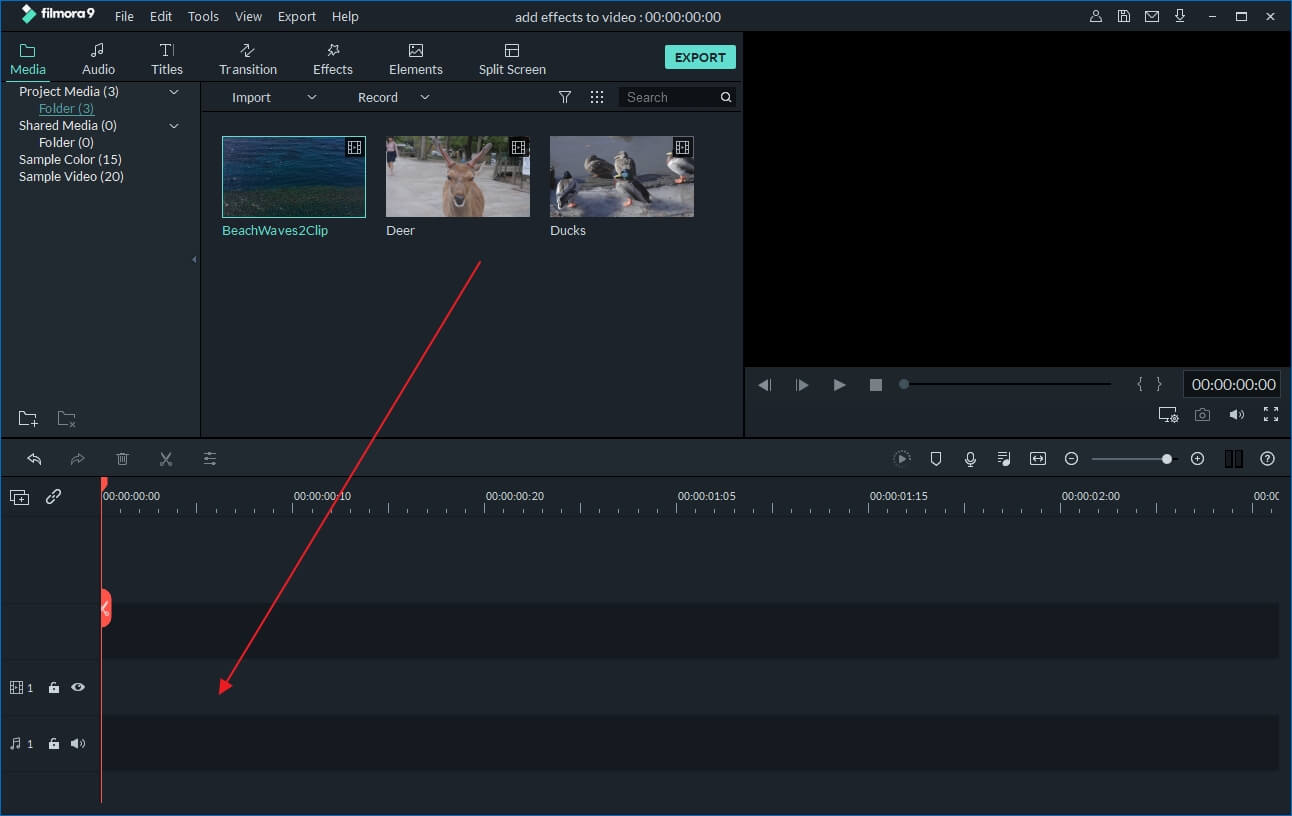
2. Apply audio fade out effect
Drop your video/audio to the Video/Audio Timeline. If you need to detach the audio file from the video, you can use the Detach audio feature in Filmora to accomplish it easily.
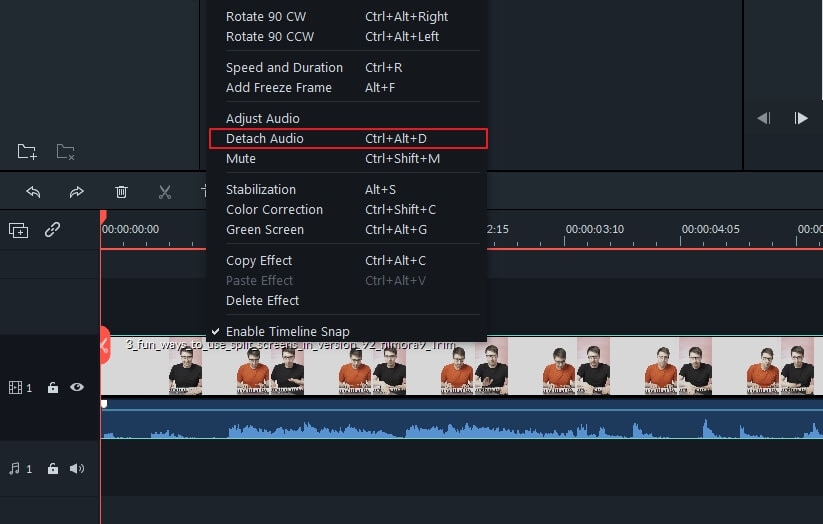
Find the “Fade Out” option from the context menu. Double click on the target file and switch to the “Audio” column. Then drag the slider bar until the audio is faded to your liking. Then you can manually set the fade out the length by dragging the slider bar to the right or left. If you make a mistake or want to change the length, click the “Reset” button. Then click the “Play” button to play the newly faded audio track.
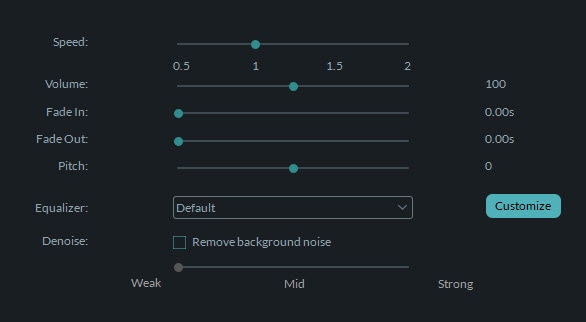
3. Save the newly faded file
You can specify the output format, output name, and output folder. If you want to specify the detailed parameters, click the triangle beside the “Advanced settings” option and make changes by clicking the drop-down list. If you’re satisfied with the result, click the “Export” button, and then an output window will pop up.
If you want to play the new file on mobile devices such as iPhone, iPad, iPod, Zune, go to the “Device” tab and choose a specific device from the list. You can also directly share the file to YouTube and Facebook in the “YouTube” tab or burn it to DVD in the “DVD” tab.
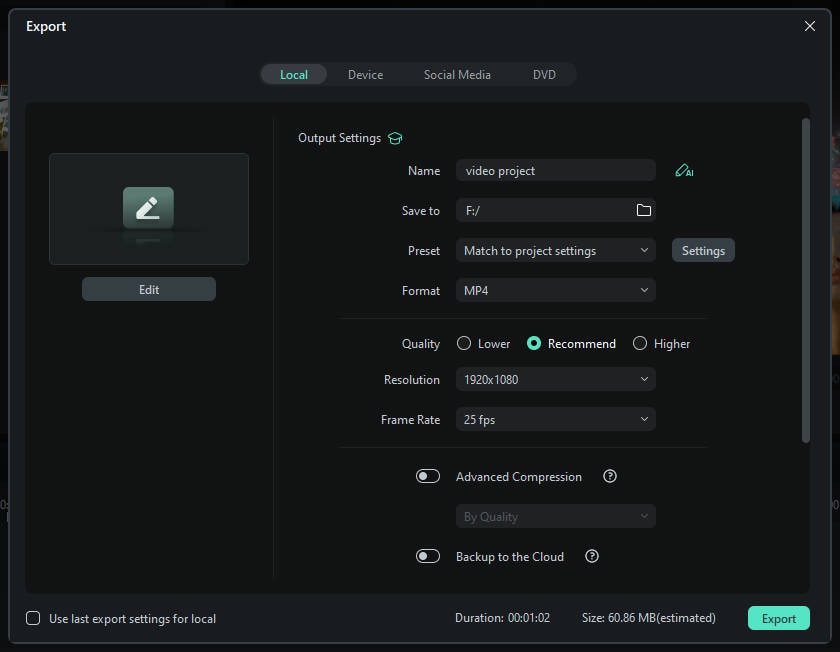
Audio fading out is a simple task with Wondershare Filmora. With this powerful video editing tool, you can also combine video/audio, split video, rotate video, add the image to mp3, remove audio from video, and more. Now download and explore more possibilities for your digital world.
Related Tips: How to Edit the Audio Track of Your Video
Versatile Video Editor - Wondershare Filmora
An easy yet powerful editor
Numerous effects to choose from
Detailed tutorials provided by the official channel
For Win 7 or later (64-bit)
For macOS 10.12 or later
How To Fade Out Audio in Wondershare Filmora?
1. Import your video/audio to Wondershare Filmora
Install and open Wondershare Filmora . Click the “Import” button to browse and import the video/audio file you want to edit. You can also drag and drop your video/audio file to the program. Wondershare Filmora supports various video and audio formats such as AVI, NSV, FLV, MKV, MP4, M4V, RMVB, TS, TP, TRP, M2TS, APE, CUE, AU, AMR, OGG, and more. You can directly import these kinds of files without conversion.

2. Apply audio fade out effect
Drop your video/audio to the Video/Audio Timeline. If you need to detach the audio file from the video, you can use the Detach audio feature in Filmora to accomplish it easily.

Find the “Fade Out” option from the context menu. Double click on the target file and switch to the “Audio” column. Then drag the slider bar until the audio is faded to your liking. Then you can manually set the fade out the length by dragging the slider bar to the right or left. If you make a mistake or want to change the length, click the “Reset” button. Then click the “Play” button to play the newly faded audio track.

3. Save the newly faded file
You can specify the output format, output name, and output folder. If you want to specify the detailed parameters, click the triangle beside the “Advanced settings” option and make changes by clicking the drop-down list. If you’re satisfied with the result, click the “Export” button, and then an output window will pop up.
If you want to play the new file on mobile devices such as iPhone, iPad, iPod, Zune, go to the “Device” tab and choose a specific device from the list. You can also directly share the file to YouTube and Facebook in the “YouTube” tab or burn it to DVD in the “DVD” tab.

Audio fading out is a simple task with Wondershare Filmora. With this powerful video editing tool, you can also combine video/audio, split video, rotate video, add the image to mp3, remove audio from video, and more. Now download and explore more possibilities for your digital world.
Related Tips: How to Edit the Audio Track of Your Video
Versatile Video Editor - Wondershare Filmora
An easy yet powerful editor
Numerous effects to choose from
Detailed tutorials provided by the official channel
For Win 7 or later (64-bit)
For macOS 10.12 or later
How To Fade Out Audio in Wondershare Filmora?
1. Import your video/audio to Wondershare Filmora
Install and open Wondershare Filmora . Click the “Import” button to browse and import the video/audio file you want to edit. You can also drag and drop your video/audio file to the program. Wondershare Filmora supports various video and audio formats such as AVI, NSV, FLV, MKV, MP4, M4V, RMVB, TS, TP, TRP, M2TS, APE, CUE, AU, AMR, OGG, and more. You can directly import these kinds of files without conversion.

2. Apply audio fade out effect
Drop your video/audio to the Video/Audio Timeline. If you need to detach the audio file from the video, you can use the Detach audio feature in Filmora to accomplish it easily.

Find the “Fade Out” option from the context menu. Double click on the target file and switch to the “Audio” column. Then drag the slider bar until the audio is faded to your liking. Then you can manually set the fade out the length by dragging the slider bar to the right or left. If you make a mistake or want to change the length, click the “Reset” button. Then click the “Play” button to play the newly faded audio track.

3. Save the newly faded file
You can specify the output format, output name, and output folder. If you want to specify the detailed parameters, click the triangle beside the “Advanced settings” option and make changes by clicking the drop-down list. If you’re satisfied with the result, click the “Export” button, and then an output window will pop up.
If you want to play the new file on mobile devices such as iPhone, iPad, iPod, Zune, go to the “Device” tab and choose a specific device from the list. You can also directly share the file to YouTube and Facebook in the “YouTube” tab or burn it to DVD in the “DVD” tab.

Audio fading out is a simple task with Wondershare Filmora. With this powerful video editing tool, you can also combine video/audio, split video, rotate video, add the image to mp3, remove audio from video, and more. Now download and explore more possibilities for your digital world.
Related Tips: How to Edit the Audio Track of Your Video
Versatile Video Editor - Wondershare Filmora
An easy yet powerful editor
Numerous effects to choose from
Detailed tutorials provided by the official channel
For Win 7 or later (64-bit)
For macOS 10.12 or later
How To Fade Out Audio in Wondershare Filmora?
1. Import your video/audio to Wondershare Filmora
Install and open Wondershare Filmora . Click the “Import” button to browse and import the video/audio file you want to edit. You can also drag and drop your video/audio file to the program. Wondershare Filmora supports various video and audio formats such as AVI, NSV, FLV, MKV, MP4, M4V, RMVB, TS, TP, TRP, M2TS, APE, CUE, AU, AMR, OGG, and more. You can directly import these kinds of files without conversion.

2. Apply audio fade out effect
Drop your video/audio to the Video/Audio Timeline. If you need to detach the audio file from the video, you can use the Detach audio feature in Filmora to accomplish it easily.

Find the “Fade Out” option from the context menu. Double click on the target file and switch to the “Audio” column. Then drag the slider bar until the audio is faded to your liking. Then you can manually set the fade out the length by dragging the slider bar to the right or left. If you make a mistake or want to change the length, click the “Reset” button. Then click the “Play” button to play the newly faded audio track.

3. Save the newly faded file
You can specify the output format, output name, and output folder. If you want to specify the detailed parameters, click the triangle beside the “Advanced settings” option and make changes by clicking the drop-down list. If you’re satisfied with the result, click the “Export” button, and then an output window will pop up.
If you want to play the new file on mobile devices such as iPhone, iPad, iPod, Zune, go to the “Device” tab and choose a specific device from the list. You can also directly share the file to YouTube and Facebook in the “YouTube” tab or burn it to DVD in the “DVD” tab.

Audio fading out is a simple task with Wondershare Filmora. With this powerful video editing tool, you can also combine video/audio, split video, rotate video, add the image to mp3, remove audio from video, and more. Now download and explore more possibilities for your digital world.
Related Tips: How to Edit the Audio Track of Your Video
Versatile Video Editor - Wondershare Filmora
An easy yet powerful editor
Numerous effects to choose from
Detailed tutorials provided by the official channel
Also read:
- [Updated] Photography Tips for iPhone for 2024
- [Updated] Top 10 Uplifting Films for Momentum & Motivation
- Complete Tutorial for Xiaomi 13T Hard Reset | Dr.fone
- Easy Tips for Removing Stored Login Credentials in Firefox Browser
- Exclusive Guide to Legal Gaming Music Without Price Tag
- Fast Track to YouTube Partner Level - Achieve 10K Views for 2024
- How to Reset your Tecno Phantom V Flip Lock Screen Password
- How To Transfer WhatsApp From iPhone 7 Plus to other iPhone 14 Pro Max devices? | Dr.fone
- In 2024, Prime Collection Must-Try Virtual Reality Games for Google Cardboard
- New Choreographed Audio Selecting Superior Soundtracks for Montage Masterpieces
- New The Ultimate Compendium of Chromes Best Audio Recording Software
- Updated 2024 Approved Expert Strategies for Merging Unparalleled Music Into MP4 Cinematics
- Updated 2024 Approved Innovative Complimentary Online Sound Regulator Systems
- Updated In 2024, Experts Choice The Top 10 Digital Stores Specializing in Montage Music Downloads
- Title: Updated Audacity Setup Guide for Ubuntu Installs, Uninstalls & Troubleshooting Tips
- Author: Ella
- Created at : 2024-10-19 02:39:43
- Updated at : 2024-10-25 23:55:01
- Link: https://sound-optimizing.techidaily.com/updated-audacity-setup-guide-for-ubuntu-installs-uninstalls-and-troubleshooting-tips/
- License: This work is licensed under CC BY-NC-SA 4.0.


